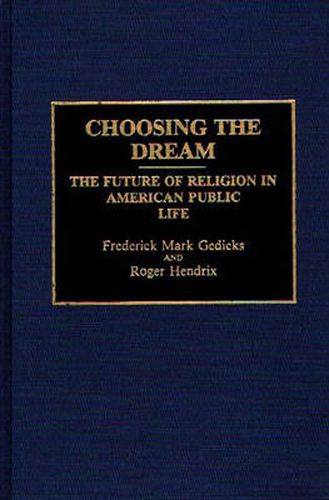Readings Newsletter
Become a Readings Member to make your shopping experience even easier.
Sign in or sign up for free!
You’re not far away from qualifying for FREE standard shipping within Australia
You’ve qualified for FREE standard shipping within Australia
The cart is loading…






Religion has been deeply embedded in the history and culture of the United States since the nation was born, and the 1970s and 1980s have seen a revival of religion which some have styled the fourth great awakening . This latest turn to religion has uncovered and defined a cultural paradox that has been evident for some time - many Americans are deeply religious in their personal lives, yet the nation’s public life is largely empty of religious content and often even hostile to religion. This contradiction between secular public and religious private life is the focus of this book. One consequence of the conflict has been deep frustration and alienation of religious people from the institutions and processes of public life, creating at least the potential for religious revolution. Given the historically pragmatic nature of American democracy, however, the authors argue that it is likely that public life will adjust to the demands of those religious people and institutions who feel excluded, accommodating them to a legitimate role in public life. The book outlines understandings of knowledge, truth, history and religion which the authors believe will challenge believers and secularists alike. They contend that, in the end, the admission of religion as an equal participant in public life will bring America closer to realizing its full potential as a nation. The book is written in a language which is intended to make it accessible to the general reader as well as academics.
$9.00 standard shipping within Australia
FREE standard shipping within Australia for orders over $100.00
Express & International shipping calculated at checkout
Religion has been deeply embedded in the history and culture of the United States since the nation was born, and the 1970s and 1980s have seen a revival of religion which some have styled the fourth great awakening . This latest turn to religion has uncovered and defined a cultural paradox that has been evident for some time - many Americans are deeply religious in their personal lives, yet the nation’s public life is largely empty of religious content and often even hostile to religion. This contradiction between secular public and religious private life is the focus of this book. One consequence of the conflict has been deep frustration and alienation of religious people from the institutions and processes of public life, creating at least the potential for religious revolution. Given the historically pragmatic nature of American democracy, however, the authors argue that it is likely that public life will adjust to the demands of those religious people and institutions who feel excluded, accommodating them to a legitimate role in public life. The book outlines understandings of knowledge, truth, history and religion which the authors believe will challenge believers and secularists alike. They contend that, in the end, the admission of religion as an equal participant in public life will bring America closer to realizing its full potential as a nation. The book is written in a language which is intended to make it accessible to the general reader as well as academics.